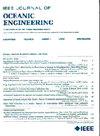Estimating Scattering Patch Area for a Direction Finding HF Radar
IF 3.8
2区 工程技术
Q1 ENGINEERING, CIVIL
引用次数: 0
Abstract
We use the radar equation along with in situ observations of Bragg-resonant ocean waves to estimate the scattering patch area for each radial velocity observation from a direction finding high frequency (HF) radar operating at 13 Mhz. Estimated areas for range cells 2–10 (3–15 km) vary from less than 1 km估算测向高频雷达的散射斑面积
我们利用雷达方程以及对布拉格共振海浪的现场观测,估算了 13 Mhz 高频寻向雷达每次径向速度观测的散射斑块面积。范围 2-10 单元(3-15 千米)的估计面积从小于 1 千米到大于 10 千米不等,平均值为 2.5 千米,标准偏差为 2.3 千米。假定有效测距单元宽度为 1.8 千米,并考虑到已知的测距范围,这大约相当于平均角宽度为 8.5$^\text{o}$,标准偏差为 10.0$^{\circ}$。散射斑块面积遵循威布尔分布,尺度和形状参数分别为 2.5 和 1.2。以补丁面积百分比表示的补丁面积不确定性平均为 36%,大部分低于 50%。了解散射斑块面积可以改进数据组合方法(如适当加权或可变分辨率合计),并提高高频雷达网络分辨小尺度流动和漩涡的能力。由于它在风速和反向散射功率之间的关系中起作用,因此了解散射斑块的大小也有助于改进高 频雷达对沿岸风的观测。
本文章由计算机程序翻译,如有差异,请以英文原文为准。
求助全文
约1分钟内获得全文
求助全文
来源期刊

IEEE Journal of Oceanic Engineering
工程技术-工程:大洋
CiteScore
9.60
自引率
12.20%
发文量
86
审稿时长
12 months
期刊介绍:
The IEEE Journal of Oceanic Engineering (ISSN 0364-9059) is the online-only quarterly publication of the IEEE Oceanic Engineering Society (IEEE OES). The scope of the Journal is the field of interest of the IEEE OES, which encompasses all aspects of science, engineering, and technology that address research, development, and operations pertaining to all bodies of water. This includes the creation of new capabilities and technologies from concept design through prototypes, testing, and operational systems to sense, explore, understand, develop, use, and responsibly manage natural resources.
 求助内容:
求助内容: 应助结果提醒方式:
应助结果提醒方式:


